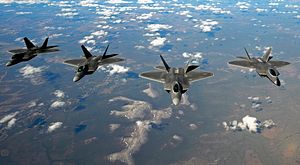Under what legal authority can the United States undertake strikes against North Korea? Dr. Steven Metz of the Army War College suggests that a “bloody nose” attack would make a mockery of international law, with potentially dreadful ripple effects across international society. Maybe… but the United States can probably assemble a case, however tenuous, that will give more than a few countries an excuse to look away.
To begin with, the question of the legality of an attack under U.S. law is mostly a settled question; under U.S. domestic law, attacking North Korea would be largely unproblematic. As Jack Goldsmith points out, lawyers would have no difficulty justifying a strike under U.S. law, which grants broad latitude to the President for using force in preventive contexts. And even regarding international law, the question is less “would war against North Korea be illegal” than “what tenuous principle would the lawyers of the Trump administration hang the war upon?” The credibility of U.S. threats against North Korea depends, at least to some extent, on a fair evaluation of these questions.
The most likely in this case is the idea of preventive self-defense. Preventive self-defense tries to drag out the logic of pre-emptive war in a temporal sense, arguing that inevitable attacks can sometimes only be preempted by actions that precede the expected attack by a significant amount of time. The logic runs thus: North Korea will certainly attack if it masters the technology associated with mating nuclear weapons to delivery systems, but this development can only be preempted by strikes at an early stage of this process.
This… is an extremely dicey idea with minimal historical support, and is not likely to prove convincing to many specialists in international law. It leaves open tremendous latitude for a state to launch a war against any state that it deems threatening at any point in the future. The real distinctions between preventive self-defense and preventive war in a more general sense are blurry, if they exist at all.
But international society may deem North Korea so annoying that it is willing to overlook the violation of clear legal principles in service of the curtailment of its behavior. Not many complained overmuch about Israel’s strike against suspected Syrian nuclear facilities in 2007, and the Syrian program was far less sophisticated than the North Korean. Similarly, while a state of unfriendliness existed between Israel and Syria, it was by no means obvious that latter would immediately use nuke against the former.
The question, really, is less “can the United States strike North Korea under international law?” than “what precedents would the United States like to leave around for other countries to pick up and use themselves?” Under this doctrine it would seem that North Korea has ample legal justification for attacks against the United States; U.S. officials have openly discussed attacking the DPRK, and appear to be moving forces to the region in order to conduct such strikes. It is possible that U.S. policymakers are taking this consideration seriously, but as of yet there seems little evidence that they care very much.

































